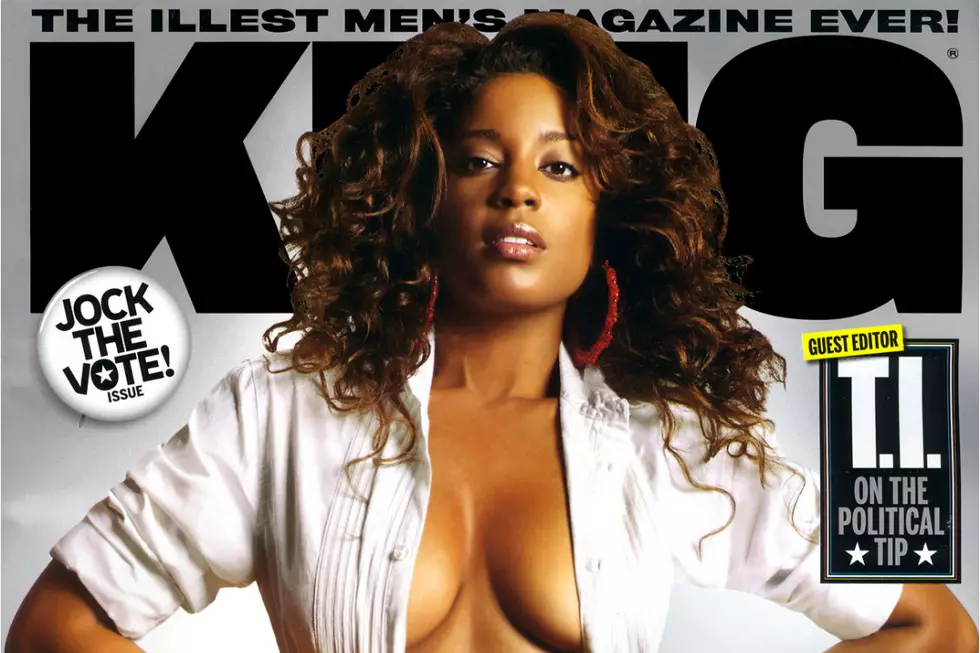Why Aren’t You Wired?
Editor's Note: THE WIRE is HBO's best show that you're not watching, and on Sunday, January 6, the final season begins. KING saw the signs early, way back at the end of the season three, and went to investigate why a show just as gangster as THE SOPRANOS never got the props it was due. Check out the trailer for the final season and then read our story.
The Wire, Season 5 Trailer
The cracked concrete park off the 1100 block of baltimore's north bond street is no place for a child. Broken glass aside, the danger is a calculating, cold-hearted drug lord named Marlo "Black†Stanfield who uses the lot as a makeshift headquarters. In his early twenties, Black has already taken control of West Baltimore, and developed a reputation for making bodies disappear in the process. This afternoon, he welcomes Calvin "Cheese†Wagstaff, a lanky East Side dealer and representative of a city narcotics co-op, to pay for a re-up of heroin. Black sends for money, and a 5-year-old runner totters over carrying a cash-filled green schoolbag. Yeah, 5 years old. There's no shame in the dope game.
This is only one of many harsh realities that the creators of HBO's The Wire refuse to sugarcoat in their depiction of the modern American city. While HBO's crown jewel The Sopranos has lost its edge and succumbed to the pressure of being a cultural phenomenon, The Wire has not traded reality for revenue (somebody please nuke the Bada Bing crew so we can get on with our lives). And yet, because its artistic strengths are also commercial weaknesses, The Wire will never emerge from the gargantuan shadow cast by Tony Soprano.
Social commentary in the guise of a crime drama, The Wire has used police investigations to examine weighty themes since its 2002 debut. Telling the truth as if they were taking a polygraph test administered by God, the cast and crew have examined issues of race, class, sexuality, social reform and the inability of institutions to serve the individuals they are supposed to. The new season follows four middle school boys and explores the ways in which society is failing at-risk youth. "This is a show about the city and about who we've become as a people, all of us, and how we're complicit in the societal failures that are overwhelming us,†says creator David Simon, 46, a former police beat reporter for the Baltimore Sun and author of Homicide: A Year On The Killing Streets (1991). That every man, woman and child capable of watching television does not know about The Wire is a crime.
Ask a fan of The Wire why they think the show has such a low profile, and they may suggest that HBO doesn't offer vigorous support. "It seems to me [at HBO] they give a lot of love to Deadwood and The Sopranos,†Spike Lee says during a phone interview. "It feels like they treat The Wire like a bald-headed stepchild.†While other new shows have been given a time slot behind The Sopranos to boost their ratings, The Wire, which has a predominantly black cast, never has. During its third season, the show was given a difficult Sunday slot opposite NFL football and ABC's runaway hit Desperate Housewives. Furthermore, the DVD set of the previous season has never been released as a timely lead-in to a new season until now (this year, the Season 3 set drops on August 8, a solid month before the Season 4's September 10 premiere).
It's easy to play the race card, but the argument that HBO has a racial bias simply doesn't stand up. "Can't blame HBO,†says Corey Parker Robinson, the young black actor who plays Detective Leander Sydnor. "We're still here. Nobody else has said yes to me. HBO has said yes to me—repeatedly.â€
Besides, how would HBO benefit from green-lighting a show only to sabotage it? As a business that exists to turn a profit, the network pumps money into products that execs believe will increase subscriptions and sell merchandise. At the end of the fourth season, the network will have funded and aired 50 episodes of The Wire.
Granted, die-hard fans were outraged when, after a standout third season, rumors surfaced that HBO was canceling the show. According to Simon, network brass were concerned that, having ended the story lines of its biggest characters, the show had nowhere left to go. After he convinced them otherwise, they renewed the show for its fourth season in March 2005. Carolyn Strauss, President of HBO Entertainment, explains the executive thought process with regards to renewal: "We have no specific formula,†she says. "In addition to cost, we also consider viewer loyalty, critical response and specific demographic appeal—or we may simply think it's a great show that has something important to say.†Execs will gauge response to the new season before deciding whether or not to proceed with a fifth one. "HBO has been pretty heroic letting us do what we want and giving us very few notes about where to go, and giving us this much rope to hang ourselves,†Simon says.
If HBO is responsible for The Wire being a sleeper series, it's due to the nature of the network. Remember: It's not TV. It's HBO. In other words, it's premium cable. Because HBO gets paid from subscriptions, not advertisers, it doesn't fret over ratings and viewer-friendliness. (Imagine if the Baltimore politicians, honestly depicted on the show as corrupt cronies, could use their connections to lean on advertisers… .) The truth is that few networks outside of HBO could even produce a show like The Wire. The catch-22 of premium cable is that, unless you have an illegal hookup, you have to pay an additional monthly fee to watch it. For a show that deals with life below the poverty line, that could prevent many potential fans from ever seeing it. "It really is one of these haves and have-nots kind of things,†says Robert J. Thompson, Professor of Television and Popular Culture at Syracuse University. "Most of the fictional characters in The Wire could probably not afford to watch the show they were on.†Merchandise isn't any cheaper. The Season 3 DVD sells for $99.98 on Hbo.com, and the price will eventually drop to $59.99. In more ways than one, quality costs.
In the second episode of the new season, Councilman Thomas "Tommy†Carcetti (played by Aidan Gillen) is unfocused while preparing for a mayoral debate in his campaign HQ. When advisors call him out, the Italian-American candidate suggests that no matter how completely he nails the ineffective and corrupt incumbent, Mayor Clarence V. Royce (Glynn Turman), his efforts will ultimately prove futile. "I still wake up white in a city that ain't,†he argues. Filmed in Baltimore, where 65 percent of inhabitants are indeed black, The Wire boasts an enormous ensemble cast that reflects this demographic. While visiting a shoot, KING learned that, through 10 of Season 4's 13 episodes, 300 speaking roles had already been cast, and 75 percent of the actors hired were black. "I'm not writing all these black characters because I'm intent on writing a ‘black show',†says Simon. "This is just the Baltimore I know.â€
While an achievement, both in terms of honesty and bucking the entertainment industry's well-documented discriminatory hiring practices, The Wire's predominantly black cast also hinders its growth. Historically, white audiences have been presented white characters that they could relate to. As more programs geared toward black audiences have emerged, so has the idea of the "black show.†For many white viewers, the predominance of black actors on The Wire indicates that it is a "black show,†and thus not intended for them. "I don't think that represents anything as hostile as racism on the part of white audiences,†says Simon, "but what it does represent is that fact that white people in America are generally not comfortable being anything other than the majority.â€
As a result of its cast makeup, and the show's true-crime feel, The Wire also lacks traditional star power. Though viewers may recognize some of The Wire cast—including veterans Glynn Turman (Cooley High, A Different World) and Frankie Faison (Coming To America, Do the Right Thing), as well as younger actors like J.D. Williams (Oz, Pootie Tang)—even they hardly qualify as huge draws. Method Man, the most recognizable, bankable star involved with the show, has a bit role, playing the East Side dealer Cheese. Sean "Diddy†Combs and Nelly, big-name celebs whose presence would undoubtedly increase awareness of the show, expressed interest in having roles written for them but were turned down. Shows like Oz and The Sopranos, which have become star-studded cameo parades, would surely have accommodated them. "Method Man has a role in The Wire because he showed up at the casting office and he nailed the part,†explains Simon. "It's not a show that benefits from having famous faces pop up in it. You really believe these people are inhabiting the world of Baltimore, because you haven't seen them in a lot of other things, so the bias would tend to be against famous people.â€
Of course, it is possible to transform little-known talent into certifiable stars (reference the cast of Entourage), but The Wire even shuns the idea of lead actors. Simon has often said that the protagonist of his show is the city of Baltimore, and that honest storytelling is more important than any single character. When the Machiavellian drug lord Stringer Bell (played by Idris Elba) was gunned down for his treacheries in Season 3's penultimate episode, many devotees were shocked (especially his adoring female fans, nicknamed Stringer Bellas). In a huge ensemble cast, he was one of three characters you might deem a lead. "I know women who not only cancelled HBO but cancelled cable after Stringer Bell got killed,†laughs Gbenga Akinnagbe, who plays the murderous Chris Paltrow. "I tell people that Stringer got killed because that's the reality of the streets: If you go around doing all the things he was doing, it eventually catches up to you.â€
Few, if any, television shows kill off a central character, especially when they're only three-fifths of the way through their network contract. The Wire, however, wrapped the story lines of all three of its main men: Bell's partner Avon Barksdale (Wood Harris) was sentenced to a long prison term, and his police adversary Detective James "Jimmy" McNulty (Dominic West) took a beat post after realizing the futility of the homicide detective's tireless chase. To fully grasp the significance of this, consider that, since Big Pussy was whacked in The Sopranos' second season, the show has refused to rub out its nucleus, Tony, Chris, Silvio and Paulie. Clearly, even HBO shows are not above concocting unrealistic ways to prolong the lives of their beloved characters to please viewers and keep the money rolling in.
Truth be told, The Wire will never be a watercooler hit. Unlike shows filmed in New York and Los Angeles, buzz-building media does not cover its every move. Longtime residents of Baltimore, Simon and his 59-year-old co-creator Ed Burns, a former policeman and public school teacher, have an edgy outsider's mentality common in their forgotten, drive-through city. Neither plays the ass-kissing political games so vital to award show recognition (The Wire has won the distinguished 2004 Peabody Award, but has only received one Emmy nomination, in the Outstanding Writing For a Drama Series category). "For us,†Burns explains, "it's [about] just trying to make the show as real as possible, to make the characters as interesting and challenged as possible.â€
Years from now, people will look back on The Wire and marvel at how a television program captured exactly who we are as a society, without euphemism. Michael K. Williams, better known as Omar Little, the show's infamous gay stick-up man, sums up the legacy best. "The Wire will be known for its rawness,†he says, "its honest and its uncanny ability over five years to tell the fuckin' raw truth.†And that's no lie.
More From King







